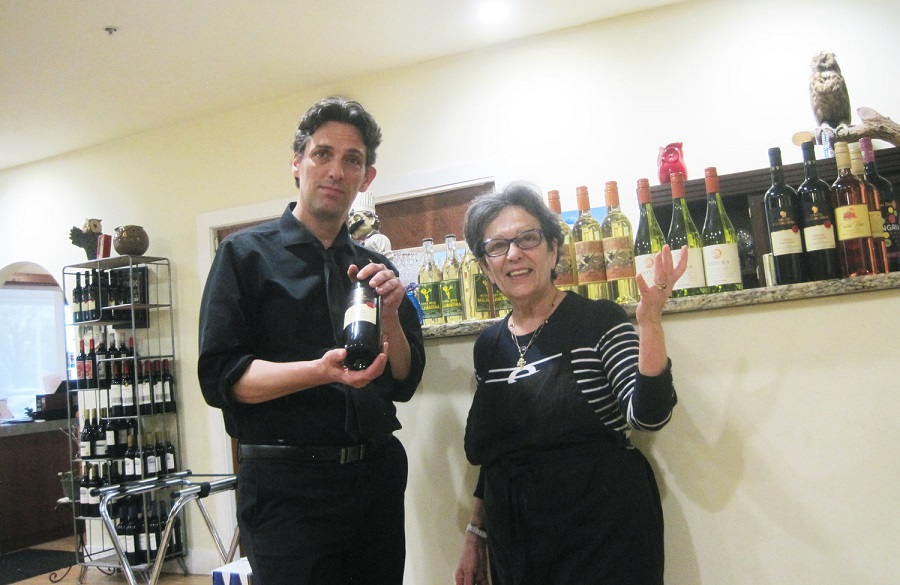Hospitality Is In Our DNA
story by GEORGIO VALENTINO

Full disclosure: I was raised in a family restaurant not unlike Athenian Owl. So was the Owl’s owner, George Triantafillopoulos. In my case, it was in suburban West Palm Beach; in his, (duh!) Athens, Greece. But distance matters not. We get each other. Then again, Greeks have a way of becoming fast friends.
“Hospitality is in our DNA,” the restaurateur says as he shovels tender slices of grilled octopus onto my plate. “We Greeks get connected through dining. For us, going out to dinner is a way of having a good time with all the people in the room, not just our party. I wanted to bring that philosophy here.”
Triantafillopoulos is aided in his mission by a prodigious gift of gab. The gregarious Greek greets and seems to know everyone who walks through his front door. (“We don’t have customers here, you know,” he tells me in an aside. “We have friends.”)
Once they’re seated, these friends can expect a cordial visit (or three) from their host. Triantafillopoulos works the dining room like Mick Jagger works the stage. He’s even got his own lanky swagger, though not nearly as avian in essence as the Rolling Stones singer.
Then there’s the food, a mix of classic and contemporary Greek fare. The usual suspects—pastitsio, moussaka, bifteki, souvlaki and gyro—are all here and house-made. Triantafillopoulos is quick to give credit where it’s due.
“Mama Georgia and my wife, Marilena, are responsible for the rave reviews,” he admits.
His mother is a seasoned veteran in the kitchen, having cooked professionally for decades. And, yes, Georgia is as sage and sassy as any pop-culture version of the Greek yia-yia. (They have a reputation.) She’s also very generous with the portions. Witness Mama’s dolmades. Not your standard-issue grape leaves—all filler (rice), no killer (protein)—these are effectively foliage-wrapped keftedakia (meatballs).
The Athenian Owl opened in December 2017, but the family are no strangers to Northeast Florida. Born in Athens, Triantafillopoulos was raised between Greece and America. He spent his crucial tweens in Jacksonville. Then it was back to Greece for a long while.
“I was gone for 18 years,” he says, “but I still have friends from that era. I went to school at San Jose Catholic and Bishop Kenny. All my old teachers and principals eat here.”
His decision to return to Jacksonville was a difficult one. It’s a common predicament, dating back hundreds—perhaps thousands—of years. You see, the Greeks have been wandering the Earth even before there was a Greece, at least in the modern sense. Folks sharing the Greek language and Orthodox religion spent some 400 years under Ottoman Turkish occupation, during which time many left … because they were under Ottoman Turkish occupation.
Modern Greece was won after a long and bloody war of independence in the 1820s. At first it was a kingdom, complete with a German king (installed under British auspices). Now it’s a republic. But it’s never really been the Greece that Greeks imagined as their homeland. From the start it was crowded, cramped and arid. What’s more, the Turks still had—and still have—the capital city of Greek dreams: Constantinople (now it’s Istanbul).
Things got worse in the aftermath of World War I, when, in the throes of nationalist revolution, the Turks ethnically cleansed the historically Greek coastal cities of Asia Minor, including trade and tourism hub Smyrna (now it’s Izmir). Greece was already tiny and poor. It couldn’t comfortably absorb a million refugees. Then there was World War II, a subsequent civil war, rule by military junta, and now a chronic debt crisis brought on by predatory German banks.
That, in a nutshell, is how the Greeks ended up abroad en masse. For most, the decision is fraught: to leave home and hearth and find one’s way in a foreign land, or to remain and attempt to make ends meet against all odds. With the debt crisis biting, Triantafillopoulos chose to split.
“I’m back for good now,” he says. “My kids have opportunities here that they wouldn’t have in Europe. Plus Mama wanted to come back. She had a restaurant before, so we did the obvious thing.”
Upon his return to Jacksonville, Triantafillopoulos chose to not resettle in San Marco, but to put down roots in Baymeadows, explaining, “It’s an excellent neighborhood. Folks come in from Deerwood and Deercreek. There are lots of business travelers from the hotels here.”
“And,” he laughs, counting up the number of South Asian restaurants and grocery stores along Baymeadows Road, “we’re the only alternative to the Indians!”
How has Jacksonville changed since his youth? “It’s constantly growing,” Triantafillopoulos says. “And people are much more knowledgeable now about what they want to eat. That’s actually how we’re differentiating ourselves. We’re honest about what we serve.”
